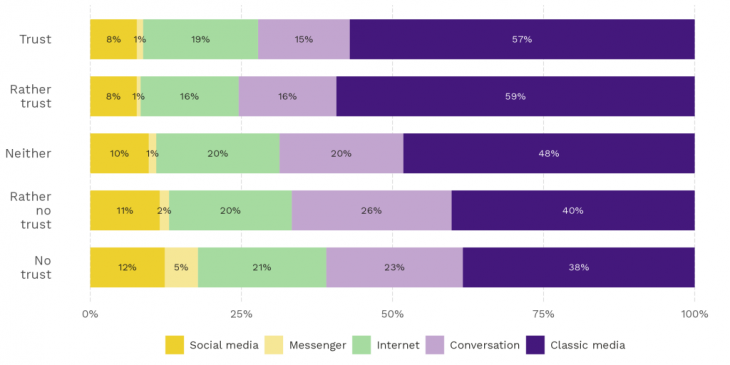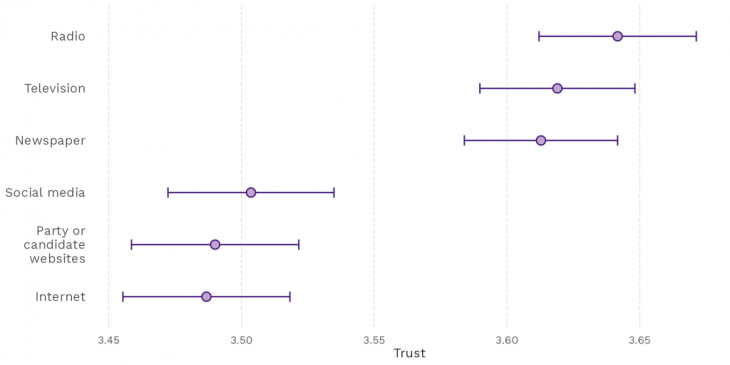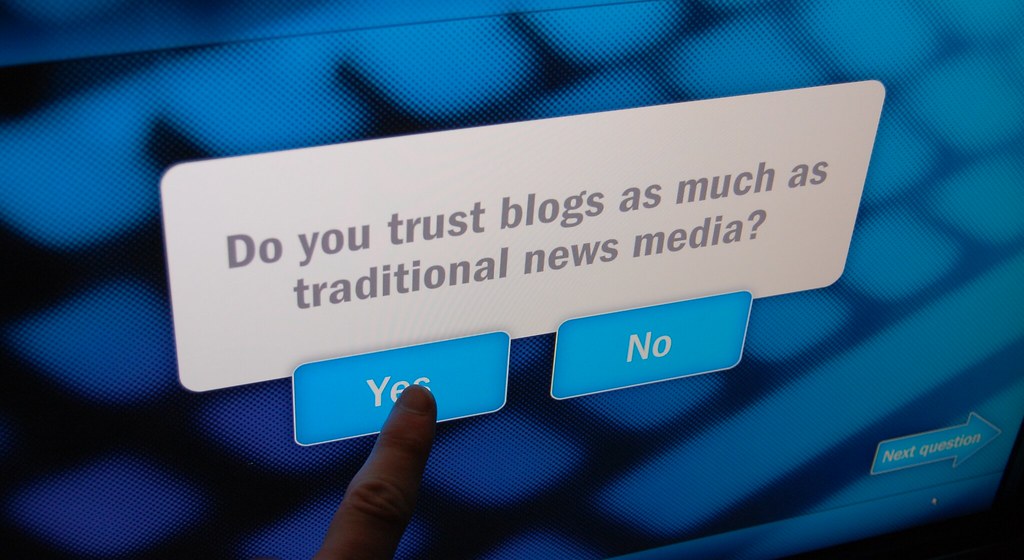The functioning of democratic systems relies to a large extent on citizens’ trust in political institutions. For example, trust in the electoral process is important for people’s participation in elections and recognition of election results. A lack of trust in the electoral process can lead to representational bias and distrust of the system. The recent insurrection on Capitol Hill on 6th January 2021 was a direct consequence of a lack of trust in the electoral process of the 2020 US presidential election. The sustainability and stability of democracies are therefore intimately linked to the trust that individuals have in their institutions. But what factors influence people’s trust in political institutions?
One fundamental aspect that influences the formation of political stance and values is the consumption of information. Citizens exposed to different types of information are more likely to develop divergent opinions on specific subjects than individuals exposed to similar information. In Switzerland, the debate on the television licence fee has been raging for some years now, with two popular votes since 2018, and a third in the pipeline. The reforms are aiming at limiting media funding, reducing the country’s traditional media supply. What’s more, the ongoing digital transition is transforming the way information is distributed. To understand how these developments affect people’s trust in political institutions, we asked in a post-election survey what sources of information Swiss citizens use to find out about politics and what trust respondents have in political institutions.
The results of our survey show that a large majority of respondents use traditional media as their main source of information (53%). Conversations with family, friends and at work are the main source of information for 18% of individuals, and the web is also the main source of information for 18% of respondents. Social networks are more widely used today, but represent the main source of information for less than 10% of respondents. The traditional media are therefore the main source of political information for more than half of the population. But what are the effects on trust in political institutions? Figure 1 shows the distribution of trust in institutions according to respondents’ main source of information.
Figure 1. Trust in institutions according to the source of information

Figure : Alix d’Agostino, DeFacto • Data : survey conducted
Figure 1 shows that trust in political institutions is higher for respondents who use traditional media as their main source of information. Generally speaking, it seems that the consumption of information from traditional media increases trust in political institutions. In total, two-thirds of individuals who have a high level of trust in institutions indicate using traditional media, whereas only 38% of respondents with a low level of trust indicate that they use traditional media as their main source of information. There is therefore a strong relationship between consumption of traditional media and trust in political institutions.
However, this only concerns the main source of information. In order to find out more precisely how the different types of media influence people’s trust in political institutions, we asked respondents to indicate all the sources of information they used to acquire political information during the campaign. In all, 52% of respondents said they got their information from newspapers, 46% from television and 22% from radio. In terms of online sources of information, the results show that 18% of respondents used social networks and 28% said they used the web. Finally, a large proportion of respondents also say they rely on discussions with friends and family as a source of political information (41%). This rate is lower for discussions at work (14%).
This consumption of information is also linked to people’s trust in political institutions. Figure 2 shows the average level of trust in institutions by media source.
Figure 2. Average trust in institutions by media source

Figure : Alix d’Agostino, DeFacto • Data : survey conducted
Figure 2 shows that individuals who consume more traditional media -TV, radio and newspapers- tend to place more trust in political institutions. We can see that this average is significantly higher than the trust in institutions of respondents who say they use the web or social networks.
In summary, our survey shows a strong link between the consumption of information in traditional media and trust in political institutions. The use of social networks and information on the web is -in turn- associated with lower confidence in political institutions. Given the predominant role of trust in institutions for the sustainability of democratic systems, and the growing importance of online sources of information associated with lower trust in democratic institutions, it seems that the traditional media have an important role to play in disseminating political information among the population. The effects of television licence fee cuts in Switzerland need to be considered in their entirety and it is essential to consider that the media supply in Switzerland contributes to political stability. Weakening existing media institutions can lead to less stability and it is now up to the Swiss population to highlight the potential individual gains from a lower licence fee and the societal cost of weakening media institutions.
Picture: Flickr
Note: this article has been edited by Robin Stähli, DeFacto






